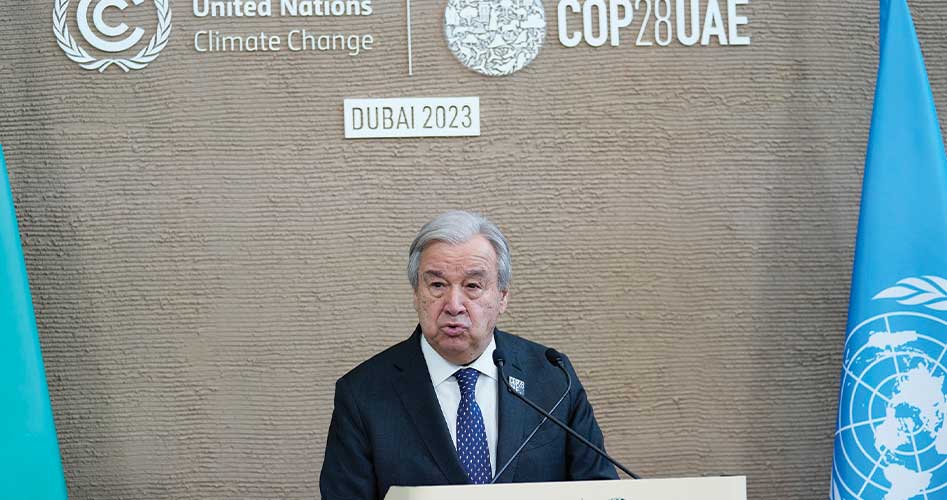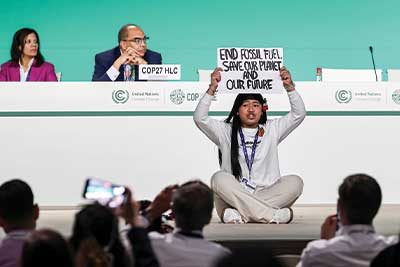
“Global Stocktake”: What the Catchphrase Really Means
DUBAI — Of all the provocative catchphrases bandied about during COP28, the most conspicuous — and the most baffling — was the “Global Stocktake.” We aren’t sure why the United Nations planners chose this obscure phrase instead of a more widely recognized synonym such as “self-assessment” or “self-evaluation.” Perhaps the deliberate choice of a word whose meaning most of us needed to google was calculated to provoke greater interest, discussion, or even reverential awe. After all, anyone casually throwing around a term the man on the street has never heard of must be possessed of far greater wisdom than the rest of us, right?
Certainly the globalists calling the shots at COP28 think so, or else they would not have gone to the trouble of creating an entirely new set of webpages and videos to explain what the Global Stocktake is. In brief, according to the UN’s website, the Global Stocktake is “like taking inventory. It means looking at everything related to where the world stands on climate action and support, identifying the gaps, and working together to chart a better course forward to accelerate climate action.” It is supposedly the first ever Global Stocktake, lending additional gravity to the occasion. But it’s also the first of many, slated by our superiors to occur every five years, beginning with this year’s climate conference, and is designed to smooth the way toward the ultimate goal of world government by climate fiat.
In his opening remarks at COP28, Simon Stiell, executive secretary of the United Nations Framework Convention on Climate Change, made sure to emphasize the term, warning that the world is “standing at a precipice, facing the Global Stocktake.” On December 1, at the official opening ceremony, UN Secretary-General António Guterres invoked the phrase repeatedly, warning that the “success of this COP depends on the Global Stocktake prescribing a credible cure in three areas.” These, he went on to explain, were:
First, drastically cutting emissions. Current policies would lead to an earth-scorching three-degree temperature rise. The Global Stocktake must set clear expectations for economy-wide Nationally Determined Contributions, that cover all greenhouse gases, and align with the 1.5-degree limit. The G20 — which represents 80 percent of the world’s emissions — must lead. I urge countries to speed up their net zero timelines, to get there as close as possible to 2040 in developed countries and 2050 in emerging economies.
Second, we cannot save a burning planet with a firehose of fossil fuels. We must accelerate a just, equitable transition to renewables. The science is clear: The 1.5-degree limit is only possible if we ultimately stop burning all fossil fuels. Not reduce. Not abate. Phaseout [sic] — with a clear time frame aligned with 1.5 degrees.
The Global Stocktake must not only commit to that — it must also commit to triple renewables; double energy efficiency; and bring clean energy to all by 2030.
The economics are clear: the global shift to renewables is inevitable….
Third, climate justice is long overdue. Developing countries are being devastated by disasters they did not cause. Extortionate borrowing costs are blocking their climate action plans. And support is far too little, far too late. The Global Stocktake must commit to a surge in finance, including for adaptation and loss and damage. And it must support reform of the multilateral development banks to leverage far more private finance at reasonable costs for developing countries on climate action. And developed countries must show how they will double adaptation finance to $40 billion a year by 2025 — as promised — and clarify how they deliver on the $100 billion — as promised.
Put Plainly
The Global Stocktake is simply another name for the three-pronged agenda of COP28, an agenda so radical and so counter to reason and common sense that it had to be given a lofty-sounding label to obscure its irrational aims. And those aims are 1) drastically reduce greenhouse gas emissions, 2) completely phase out the use of fossil fuels and replace them with “renewables,” and, 3) in the tradition of international socialism, commit to a massive transfer of wealth from rich to poor countries in the name of “climate justice.” This last in particular must have been music to the ears of Guterres, whose socialist credentials are impeccable: He served as both the secretary-general of the Socialist Party of Portugal and as the president of the Socialist International long before his appointment as the ninth UN secretary-general.
The first goal is certainly not new, but the ferocity of commitment on the part of its radical boosters is. Americans have grown accustomed to dismissing the vaporings of climate extremists as inconsequential posturing that will never have any significant effect on an independent and robustly capitalist America. But the decades of pressure and propaganda have taken their toll, pushing the anti-fossil fuel agenda into every public-school curriculum in the country, and browbeating a large part of the American public and the politicians they elect into believing that, after all, the man-made climate Götterdämmerung is nigh. This, it must be acknowledged, is a spectacular feat of propaganda, reflecting how effective the “Big Lie” can be when its supporters manage to sustain it for decades. Talk of man-made global warming/climate change has been around since the 1980s, with little changing save the terminology, while other environmental bugbears, such as global cooling, acid rain, and ozone depletion have come and gone. The reason for the persistence of the global-warming narrative is now crystal clear: It is the only environmental issue that is both global in scope and also useful to effect dialectic antagonism between the global haves and have-nots, antagonism serving as a prelude to the mother of all socialist leveling schemes: the loss and damage payments for “climate justice.”
Manufactured outrage: A radical demonstrator allegedly representing the “grassroots” demonstrates at COP28. Tellingly, all of the demonstrators exercising “free speech” at COP were agitating for more radical climate policies, while none demonstrated in opposition to COP28’s agenda. (AP Images)

The amounts being contemplated for loss and damage payments are staggering. As the UN’s chief climate-change online resource coyly puts it, “The stocktake also points to a growing gap between the needs of developing countries and the support provided and mobilized for them, and calls for the unlocking and redeployment of trillions of dollars towards climate action and climate-resilient development.” Exact figures are still disputed, but what’s not in dispute is, first, that the United States is the chief culprit and, second, that the United States must pay out the lion’s share of the swag. This, in spite of the fact that the U.S. government has a decades-long track record of being more generous with other people’s money than any other government in the world, having paid out more than $3.75 trillion in unreciprocated foreign aid since the end of World War II. By all indicators, the loss and damage program will dwarf all previous U.S. foreign aid, and will go a long way toward accomplishing its real goal: bankrupting the United States and bringing it down to the level of impoverished socialist plutocracies the world over.
As for the most radical of the three agenda items of the stocktake, the total phaseout of fossil fuels (euphemistically called the “energy transition”) must be reckoned as only a first, baby step toward the bigger, even more appalling goal: the total deindustrialization and de-modernization of the world. Since the dawn of the modern age, technological and scientific progress have been great factors in the empowerment of the individual against the state, as well as in improving the standard of living. So, naturally, global elites, who detest the empowerment of their inferiors, are opposed to it. Every great technological advancement, from the printing press to the automobile to the internet, has transformed the human condition for the better, conferring on ordinary people both freedoms and standards of living once reserved for the elite few that constituted the ruling classes. To the elites, it is intolerable that anyone other than they should have unfettered access to convenient international travel; hence commercial jet travel must be curtailed. They gnash their teeth at the fact that mere mundanes can hop in their private cars and drive across the country at will; cars must be banned or made so expensive that only the deserving rich can drive them. They are indignant that, rather than huddling around fires in smoke-filled huts during the winter, the hoi polloi actually have access to heating fuel that they can adjust to their own comfort range. And on and on.
Just the Beginning
But the anti-fossil fuel madness won’t stop with a ban on gasoline, natural gas, and heating oil. It will eventually be extended to include all petroleum-derived products, such as polyethylene (aka plastic), silicone, polypropylene, neoprene, nylon, and so forth, all of which are less biodegradable than, say, paper or organic waste, and are regularly scapegoated for ecological issues such as the “Great Pacific Garbage Patch.” And, lest this strike the reader as hyperbole, consider these words of wisdom from the UN Environment Programme’s (UNEP) own website:
Plastic pollution is a global problem. Every year 19-23 million tonnes of plastic waste leaks into aquatic ecosystems, polluting lakes, rivers and seas.
Plastic pollution can alter habitats and natural processes, reducing ecosystems’ ability to adapt to climate change, directly affecting millions of people’s livelihoods, food production capabilities and social well-being.
And for good measure, here’s the UNEP’s executive director, Inger Andersen, weighing in on what needs to be done about plastics: “We will not recycle our way out of the plastic pollution crisis: We need a systemic transformation to achieve the transition to a circular economy.” (Emphasis added.)
Yes, folks, they’re not going to stop with taking away your gasoline and heating oil; they’re also going to be coming for your plastics — meaning, in effect, that the most useful substances ever devised by human ingenuity, upon which all of our modern gadgetry, from medical devices to computers to airplanes, is crucially dependent, will eventually be banned. If global elites have their way, we’ll all be back to napped flint, hand-blown glass, and home-smelted implements before long.
Fortunately for humanity, a modicum of common sense did prevail at COP28. Although a schedule for assessing loss and damage payments was agreed upon in principle, the much-anticipated consensus on a fossil-fuel phaseout failed to materialize. This was in no small measure because Sultan Ahmed Al Jaber, the Emirati oilman presiding over the event, refused to let it happen. In response to this epic fail, the histrionics from developing-world delegates, especially island nations, were as hysterical as they were deceptive. For example, Esa Sharon Mona Ainuu, a government minister from the tiny island nation of Niue, broke down in tears at a post-COP press conference after wondering what she was going to tell her daughter. “Sea level rise is just getting worse. Our food sources are gone and people are drowning,” she added. In addition to the shameless hyperbole (no, people aren’t drowning or starving in Niue or any other Pacific nation), she failed to mention that tiny Niue happens to have one of the highest per-capita rates of greenhouse gas production in the world, an inconvenient truth of the sort that climate fanatics habitually ignore.
So the fossil fuel “energy transition” has been avoided, at least for now. But rest assured that the elites will be back to try again next year.

